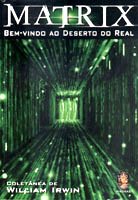Hamish Dewe on The Matrix
 Last week Danyl Strype, a very enthusiastic member of the collective that runs the local indymedia site, pasted an article up there called 'Why Aotearoa Needs Anarchy'. Not for the first time, I found it difficult to understand what Strype was talking about; I did notice, though, that his piece used The Matrix as a metaphor for the society in which we live.
Last week Danyl Strype, a very enthusiastic member of the collective that runs the local indymedia site, pasted an article up there called 'Why Aotearoa Needs Anarchy'. Not for the first time, I found it difficult to understand what Strype was talking about; I did notice, though, that his piece used The Matrix as a metaphor for the society in which we live. I've already blogged about the widespread use of The Matrix by critics of modern capitalist society, and soon after seeing Strype's article I stumbled upon an old text by Hamish Dewe, the now-exiled enfant terrible of the '90s Auckland literary scene. Hamish's article, which as I remember was published in a peripheral left-wing publication at the end of the 90s, is interesting as a very early example of the use of The Matrix by a critic of capitalism. It must have been written quite soon after the film made it to Kiwi movie theatres. Since Hamish's piece isn't online anywhere, I've taken the liberty of reproducing it here. Hopefully he won't put a long-distance curse on me from his present dwelling place in the alchemist's quarter of old Beijing...
The Matrix and Marx.
The Matrix is concerned, as is all good Sci-Fi, more with the present than the future. In the film, the machines which inherit the earth recreate our own late capitalist society as a tool to keep their human drudges more-or-less happy, and almost totally quiescent. The Matrix is a system of control which is ideological in nature, an ideology being a system of ideas which forms the basis of a political or economic situation. In the economy of the future, run by the machines, electricity is the prime commodity. Ideology keeps its subjects in their assigned place for economic reasons: in order to exploit their productive capacities. The justification for ideology is, as Morpheus explains to Neo, “To turn a human being,” holding up a duracell battery, “into this.” The Matrix is a tactic used in order to extract electricity, as surplus value, from an individual, from any individual unlucky enough to be inserted into it. Ideology is, in short, a tool to enable the exploitation of a mass of individuals so that others may gain an economic advantage.
It is no accident that this particular society has been decided upon in order to keep the Matrix’s occupants quiet, since the aims of each are so similar. There has been, perhaps, at no point prior to this, a society as manifestly good at ensuring the obedience of the majority of its citizens in all the major facets of life. The society I’m referring to here is, of course, our society: the society of late capitalism, remarkably international in nature, which is bound by neither linguistic nor cultural differences, so long as all its subjects remain bound to its ideology, which is the ideology of capitalism. We are, as citizens, forced into the cage of wage labour by pure individual necessity. There is no other option, except the option to starve. Some may point to the existence of the unemployment benefit here, but few of us would choose to live on such an insufficient income, especially when our entire society is enforcing the idea that to receive the benfit is to be a dole bludger, a person who is of literally no worth to (capitalist) society, with the inevitable self-esteem problems it engenders in the unemployed. Unemployment is a punishment, not a priviledge, and the fact that it is seen as such is a function of ideology. It is a concept with a particular economic reason: to encourage as many of us as possible to remain within the political, social, and economic structures of capitalism. That is, to get a haircut and get a real job.
The only option open to most of us, then, is wage labour. And once we’re inserted into that slot, it is just as if we were batteries in a walkman. We are only there in order to be exploited for our productive capabilities. In the real world, we are the producers of wealth, but not its beneficiaries. In the world of the Matrix, we are the producers of electricity, but not its beneficiaries, which brings us to the problem of resistance.
In the world of the Matrix, resistance was dangerous, but comparatively easy. Just remove yourself from the Matrix, and there you are. On the outside. But how can one get on the outside of our own Matrix, the world of ideology? That one’s much more difficult. The resistance here must take place on two levels simultaneously. We must struggle against the ideology itself, that system of ideas which has no philosophical basis, merely a certain utility in exploitation. We must also struggle against specific instances of exploitation as we come up against them. This is a struggle for power, both social and economic. A power which we produce, but which is somehow taken from us. The only alternative is to remain…a coppertop.

3 Comments:
Really good post.
I was expecting, knowing this blog, a picture of you, with your upper torso backwards 90 degrees.
Really fun read.
I linked to your blog.
excellent way to use and compare, a complicate life style with this awesome film, you found hundreds of similarities between the movie and this society manner life.
I think that this is wonderful, It is really nice, matrix is one of the best and really good stories... I want to have the Original DVD!
Post a Comment
<< Home